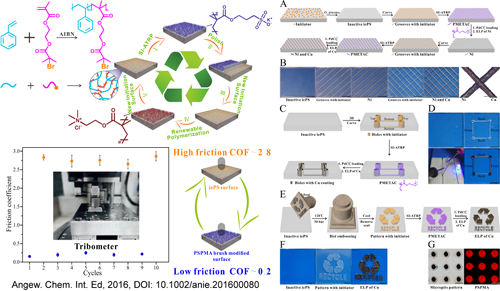| News |
| ・Events |
| ・Int’l Cooperation News |
| ・Upcoming Events |
| Location: Home>News>Events |
| Repeated Modification of Surfaces with Polymer Brushes Becomes Possible |
| ||||||
|
|
Bio-Inspired Renewable Surface-Initiated Polymerization from Permanently Embedded Initiators (Image by ZHOU Feng et al.) Surface chemical modification plays an important role in modern chemistry, biology, material science and so on. As a widely used surface modification method, surface grafted polymer brushes are applicable to many monomers, can modify various substrates and their structure are controllable. To prepare polymer brushes through surface-initiated atom transfer radical polymerization (SI-ATRP), an initiator has to be anchored and the modified substrate can only be modified once, which causes a great waste. The research group headed by Professor ZHOU Feng at the Lanzhou Institute of Chemical Physics (LICP) of the Chinese Academy of Sciences (CAS) has developed a simple and robust approach to repeatedly modify surfaces with polymer brushes through SI-ATRP, based on an initiator-embedded polystyrene sheet that does not rely on specific surface chemistries for initiator immobilization. The surface-grafted polymer brushes can be wiped away to expose fresh underlying initiator that re-initiates polymerization. This new method has outpaced the traditional surface-grafting technologies owing to unlimited grafting cycles and its exquisite control over chemical composition, film architecture, and functionalities, which can be easily manipulated through straightforward preparative procedures. Interestingly, it can be combined with carving, micromachining, and hot embossing, and allows polymer grafting and metal deposition stereoselectively. This strategy provides a facile route for modification of molded or embossed surfaces, with possible applications in the preparation of fluidic devices and polymer-embedded circuits. The findings have been published in Angew. Chem. Int. Ed. 2016 ( Angew. Chem. Int. Ed. 2016,DOI: 10.1002/anie.201600080). And the work has received support from the National Natural Science Foundation of China. Contact: ZHOU Feng State Key Laboratory of Solid Lubrciation, Lanzhou Institute of Chemical Physics, Chinese Academy of Sciences, Lanzhou 730000, China E-mail: zhouf@licp.cas.cn |
